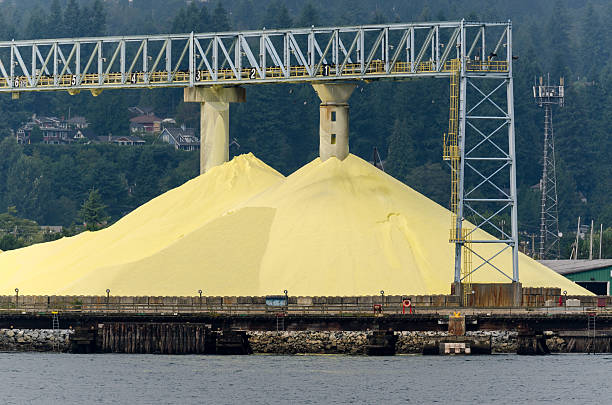Did you know that choosing the right type of sulfur—natural or industrial—can significantly improve cost efficiency and the final quality of your products? In this article, we explore the differences, advantages, and applications of each type to help you make strategic decisions.

Natural sulfur and industrial sulfur (also known as processed sulfur) are two distinct forms of the element sulfur, each with its own unique properties and uses. Natural sulfur is primarily extracted from geological sources and exists in various forms in nature, including mineral deposits or in its pure state. This type of sulfur typically contains impurities and other compounds that may affect its quality. For instance, natural sulfur may include additional minerals that, in some cases, influence its properties. Often, it is used as a soil nutrient in agriculture, where it plays a crucial role as a fertilizer and in the production of plant protection products. It enhances soil quality and serves as an essential nutrient for plant growth.

In contrast, industrial sulfur is produced through chemical processes and industrial extraction methods, typically offering a higher purity level than natural sulfur. This type of sulfur is commonly obtained from refining processes, natural gas extraction, or the purification of copper, allowing for greater control over its composition.
Industrial sulfur serves as a key raw material in the production of various chemical compounds, including sulfuric acid. Due to its high purity and controlled processing, it is widely used in the petrochemical industry, gas purification, and the manufacturing of rubber and plastics. Additionally, it has extensive applications in chemical industries that require high-quality raw materials.
There are also other differences between these two types of sulfur, particularly in terms of economic and environmental aspects. The extraction of natural sulfur may have a lower environmental impact since it is usually obtained directly from natural sources without requiring complex chemical processes.
On the other hand, industrial sulfur production often involves more intricate processes that require higher energy consumption and may have a greater environmental footprint. Additionally, the cost of these two types of sulfur varies, as extraction and processing expenses can influence their final market price.
Comparison at a Glance: Natural vs. Industrial Sulfur
Natural Sulfur (Mineral)
Source: Extracted from natural mines
Purity: 85%-95% (with beneficial minerals)
Cost: More affordable
Eco-Friendliness: Environmentally friendly
Key Uses: Agriculture, green projects, pharmaceuticals
Industrial Sulfur (Refined)
Source: Produced through refinery processes and copper purification
Purity: 99%+ (high purity)
Cost: Higher (due to complex processing)
Eco-Friendliness: Requires careful waste management
Key Uses: Petrochemicals, pharmaceuticals, refineries, sulfuric acid production, water treatment
Choosing the Right Type:
• For agriculture and eco-friendly applications → Natural Sulfur
• For high-purity industrial applications → Industrial Sulfur
Key Questions to Consider Before Choosing
• What is your primary goal? (Cost reduction, quality improvement, environmental protection?)
• Do you require ultra-high purity?
Ultimately, the choice between natural sulfur and industrial sulfur depends on the specific needs of your industry and intended application. For example, in agriculture, natural sulfur may be more desirable as it serves as a vital nutrient for plants. In contrast, the chemical and petrochemical industries favor industrial sulfur due to its high purity and specialized properties.
These differences highlight the importance of thoroughly understanding each type of sulfur and their impact on various industries.
Both natural and industrial sulfur have extensive applications across various industries due to their unique properties and characteristics. Natural sulfur, primarily extracted from mines or natural sources, is a key raw material in agriculture. It plays a vital role in the production of chemical fertilizers and plant protection products.

As an essential nutrient, natural sulfur contributes to soil quality improvement and enhances fertility. Additionally, it serves as a disinfectant in agriculture, helping control pests and plant diseases. Beyond agriculture, natural sulfur is also used in the food and pharmaceutical industries, where it functions as an additive or preservative.
On the other hand, industrial sulfur, due to its higher purity and advanced processing, has a wider range of applications in the chemical and petrochemical industries. One of its most important uses is in the production of sulfuric acid, one of the most widely used chemicals worldwide. This acid plays a crucial role in various industrial processes, including the production of chemical fertilizers, oil refining, and the manufacturing of other chemicals such as phosphates and nitrogen compounds.
Additionally, industrial sulfur is essential in the production of rubber and plastics, textiles, and advanced chemical compounds, as it serves as a strengthening and stabilizing agent in manufacturing processes. It also has applications in the pharmaceutical industry, where it is used as a raw material for producing various medicinal compounds. Moreover, industrial sulfur plays a key role in water purification and air pollution control, acting as an effective chemical agent for removing contaminants and improving water quality.
Ultimately, the choice between natural and industrial sulfur depends on the specific needs of each industry and its intended application. Both types of sulfur offer unique benefits and can be effectively utilized in various industrial and agricultural sectors. A thorough understanding of their applications and differences can help in making better decisions when selecting the right raw materials for production processes.
For consultation and procurement of both types of sulfur, feel free to contact us through the following communication channels.
written by :E.Haji Abadi
















